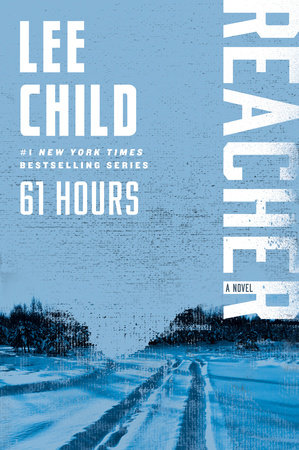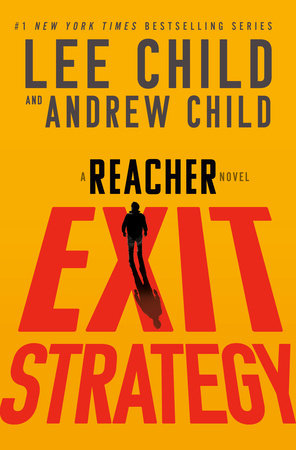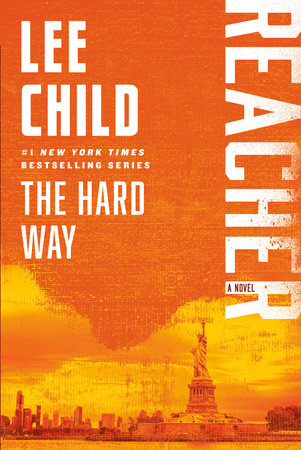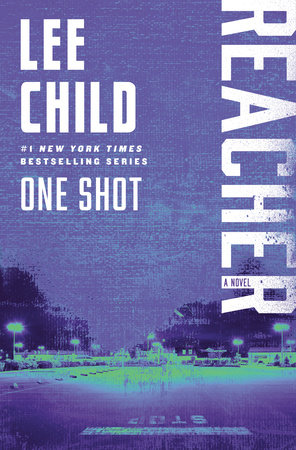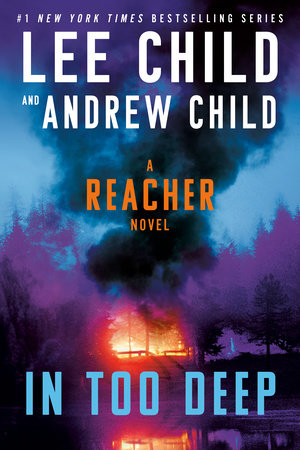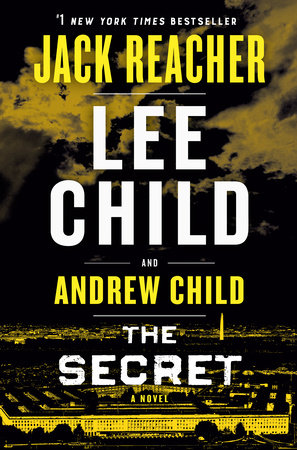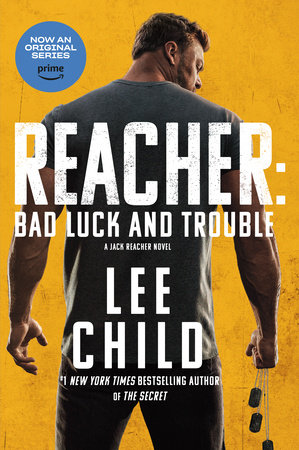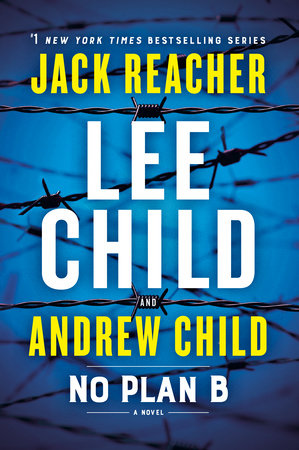Excerpt
61 Hours
Chapter One
Five minutes to three in the afternoon. Exactly sixty-one hours before it happened. The lawyer drove in and parked in the empty lot. There was an inch of new snow on the ground, so he spent a minute fumbling in the foot well until his overshoes were secure. Then he got out and turned his collar up and walked to the visitors’ entrance. There was a bitter wind out of the north. It was thick with fat lazy flakes. There was a storm sixty miles away. The radio had been full of it.
The lawyer got in through the door and stamped the snow off his feet. There was no line. It was not a regular visiting day. There was nothing ahead of him except an empty room and an empty X-ray belt and a metal detector hoop and three prison guards standing around doing nothing. He nodded to them, even though he didn’t know them. But he considered himself on their side, and they on his. Prison was a binary world. Either you were locked up, or you weren’t. They weren’t. He wasn’t.
Yet.
He took a gray plastic bin off the top of a teetering stack and folded his overcoat into it. He took off his suit coat and folded it and laid it on top of the overcoat. It was hot in the prison. Cheaper to burn a little extra oil than to give the inmates two sets of clothes, one for the summer and one for the winter. He could hear their noise ahead of him, the clatter of metal and concrete and the random crazy yells and the screams and the low grumble of other disaffected voices, all muted by doglegged corridors and many closed doors.
He emptied his pants pockets of keys, and wallet, and cell phone, and coins, and nested those clean warm personal items on top of his suit coat. He picked up the gray plastic bin. Didn’t carry it to the X-ray belt. Instead he hefted it across the room to a small window in a wall. He waited there and a woman in uniform took it and gave him a numbered ticket in exchange for it.
He braced himself in front of the metal detector hoop. He patted his pockets and glanced ahead, expectantly, as if waiting for an invitation. Learned behavior, from air travel. The guards let him stand there for a minute, a small, nervous man in his shirt sleeves, empty-handed. No briefcase. No notebook. Not even a pen. He was not there to advise. He was there to be advised. Not to talk, but to listen, and he sure as hell wasn’t going to put what he heard anywhere near a piece of paper.
The guards beckoned him through. A green light and no beep, but still the first guard wanded him and the second patted him down. The third escorted him deeper into the complex, through doors designed never to be open unless the last and the next were closed, and around tight corners designed to slow a running man’s progress, and past thick green glass windows with watchful faces behind.
The lobby had been institutional, with linoleum on the floor and mint green paint on the walls and fluorescent tubes on the ceiling. And the lobby had been connected to the outside, with gusts of cold air blowing in when the door was opened, and salt stains and puddles of snowmelt on the floor. The prison proper was different. It had no connection to the outside. No sky, no weather. No attempt at décor. It was all raw concrete, already rubbed greasy where sleeves and shoulders had touched it, still pale and dusty where they hadn’t. Underfoot was grippy gray paint, like the floor of an auto enthusiast’s garage. The lawyer’s overshoes squeaked on it.
There were four interview rooms. Each was a windowless concrete cube divided exactly in half by a wall-to-wall desk-height counter with safety glass above. Caged lights burned on the ceiling above the counter. The counter was cast from concrete. The grain of the formwork lumber was still visible in it. The safety glass was thick and slightly green and was divided into three overlapping panes, to give two sideways listening slots. The center pane had a cut-out slot at the bottom, for documents. Like a bank. Each half of the room had its own chair, and its own door. Perfectly symmetrical. The lawyers entered one way, and the inmates entered the other. Later they left the same way they had come, each to a different destination.
The guard opened the door from the corridor and stepped a yard into the room for a visual check that all was as it should be. Then he stood aside and let the lawyer enter. The lawyer stepped in and waited until the guard closed the door behind him and left him alone. Then he sat down and checked his watch. He was eight minutes late. He had driven slow, because of the weather. Normally he would have regarded it as a failure to be late for an appointment. Unprofessional, and disrespectful. But prison visits were different. Time meant nothing to prisoners.
Another eight minutes later the other door opened, in the wall behind the glass. A different guard stepped in and checked and then stepped back out and a prisoner shuffled in. The lawyer’s client. He was white, and enormously overweight, marbled with fat, and completely hairless. He was dressed in an orange jumpsuit. He had wrist and waist and ankle chains that looked as delicate as jewelry. His eyes were dull and his face was docile and vacant, but his mouth was moving a little, like a simpleminded person struggling to retain complex information.
The door in the wall behind the glass closed.
The prisoner sat down.
The lawyer hitched his chair close to the counter.
The prisoner did the same.
Symmetrical.
The lawyer said, “I’m sorry I’m late.”
The prisoner didn’t answer.
The lawyer asked, “How are you?”
The prisoner didn’t answer. The lawyer went quiet. The air in the room was hot. A minute later the prisoner started talking, reciting, working his way through lists and instructions and sentences and paragraphs he had committed to memory. From time to time the lawyer said, “Slow down a bit,” and on each occasion the guy paused and waited and then started up again at the head of the previous sentence with no change in his pace and no alteration to his singsong delivery. It was as if he had no other way of communicating.
The lawyer had what he considered to be a pretty good memory, especially for detail, like most lawyers, and he was paying a lot of attention, because to concentrate on the process of remembering distracted him from the actual content of the instructions he was getting. But even so some small corner of his mind had counted fourteen separate criminal proposals before the prisoner finally finished up and sat back.
The lawyer said nothing.
The prisoner said, “Got all that?”
The lawyer nodded and the prisoner lapsed into a bovine stillness. Or equine, like a donkey in a field, infinitely patient. Time meant nothing to prisoners. Especially this one. The lawyer pushed his chair back and stood up. His door was unlocked. He stepped out to the corridor.
Five minutes to four in the afternoon.
Sixty hours to go.
The lawyer found the same guard waiting for him. He was back in the parking lot two minutes later. He was fully dressed again and his stuff was back in his pockets, all reassuringly weighty and present and normal. It was snowing harder by then and the air was colder and the wind was wilder. It was going dark, fast and early. The lawyer sat for a moment with his seat heating and his engine running and his wipers pushing berms of snow left and right on the windshield glass. Then he took off, a wide slow turn with his tires squeaking against the fresh fall and his headlight beams cutting bright arcs through the white swirl. He headed for the exit, the wire gates, the wait, the trunk check, and then the long straight road that led through town to the highway.
Fourteen criminal proposals. Fourteen actual crimes, if he relayed the proposals and they were acted upon, which they surely would be. Or fifteen crimes, because he himself would then become a co-conspirator. Or twenty-eight crimes, if a prosecutor chose to call each separate issue a separate conspiracy, which a prosecutor might, just for the fun of it. Or just for the glory. Twenty-eight separate paths to shame and ignominy and disbarment, and trial and conviction and imprisonment. Life imprisonment, almost certainly, given the nature of one of the fourteen proposals, and only then after a successful plea bargain. A failed plea bargain was too awful to contemplate.
The lawyer made it around the highway cloverleaf and merged into the slow lane. All around him was the thick gray of falling snow in the late afternoon. Not much traffic. Just occasional cars and trucks going his way, some of them faster and some of them slower, answered by occasional cars and trucks going the other way, across the divider. He drove one-handed and jacked up off the seat and took out his cell phone. Weighed it in his hand. He had three choices. One, do nothing. Two, call the number he had been told to call. Three, call the number he really should call, which under the circumstances was 911, with hasty backups to the local PD and the Highway Patrol and the county sheriffs and the Bar Association, and then a lawyer of his own.
He chose the second option, like he knew he would. Choice number one would get him nowhere, except a little later, when they came to find him. Choice number three would get him dead, slowly and eventually, after what he was sure would be hours or even days of hideous agony. He was a small nervous man. No kind of a hero.
He dialed the number he had been told to dial.
He checked it twice and hit the green button. He raised the phone to his ear, which in many states would be a twenty-ninth crime all its own.
But not in South Dakota.
Not yet.
Small mercies.
The voice that answered was one he had heard four times before. Coarse, and rough, and laced with a kind of rude animal menace. A voice from what the lawyer thought of as another world entirely. It said, “Shoot, buddy,” with a smile and an overtone of cruel enjoyment, as if the speaker was enjoying his absolute power and control, and the lawyer’s own consequent discomfort and fear and revulsion.
The lawyer swallowed once and started talking, reciting the lists and the instructions and the sentences and the paragraphs in much the same way they had been relayed to him. He started talking seven miles and seven minutes from a highway bridge. The bridge didn’t look much like a bridge. The roadbed continued absolutely level but the land below it fell away a little into a wide shallow gulch. The gulch was dry most of the year, but five months from then spring melt water would rage through it in a torrent. The highway engineers had smoothed the gulch into a neat culvert and packed forty giant concrete tubes under the roadbed, all to stop the foundation getting washed away once a year. It was a system that worked well in the spring. It had only one drawback, which showed up in the winter. To counter it the engineers had placed signs ahead in both directions. The signs said: Bridge Freezes Before Road.
The lawyer drove and talked. Seven minutes into his monologue he reached the most obviously naked and blunt and brutal and egregious of the fourteen proposals. He recited it into the phone the same way he had heard it in the prison, which was neutrally and without emotion. The coarse voice on the other end of the phone laughed. Which made the lawyer shudder. A core moral spasm came up literally from deep inside him. It jerked his shoulders noticeably and ground the phone across his ear.
And moved his hand on the wheel.
His front tires slipped a little on the bridge ice and he corrected clumsily and his rear tires swung the other way and fishtailed once, twice, three times. He slid across all three lanes. Saw a bus coming the opposite way through the falling snow. It was white. It was huge. It was moving fast. It was coming straight at him. The back part of his brain told him a collision was inevitable. The front part of his brain told him no, he had space and time and a grass median and two stout metal barriers between him and any kind of oncoming traffic. He bit his lip and relaxed his grip and straightened up and the bus blew past him exactly parallel and twenty feet away.
He breathed out.
The voice on the phone asked, “What?”
The lawyer said, “I skidded.”
The voice said, “Finish the report, asshole.”
The lawyer swallowed again and resumed talking, at the head of the previous sentence.
The man driving the white bus in the opposite direction was a twelve-year veteran of his trade. In the small world of his specialized profession he was about as good as it got. He was properly licensed and well trained and adequately experienced. He was no longer young, and not yet old. Mentally and physically he was up there on a broad plateau of common sense and maturity and peak capability. He was not behind schedule. He was not speeding. He was not drunk. He was not high.
But he was tired.
He had been staring into featureless horizontal snow for the best part of two hours. He saw the fishtailing car a hundred yards ahead. Saw it dart diagonally straight at him. His fatigue produced a split second of dull delay. Then the numb tension in his tired body produced an overreaction. He yanked the wheel like he was flinching from a blow. Too much, too late. And unnecessary, anyway. The sliding car had straightened and was already behind him before his own front tires bit. Or tried to. They hit the bridge ice just as the steering told them to turn. They lost grip and skated. All the weight was in the rear of the bus. The huge cast-iron engine block. The water tank. The toilet. Like a pendulum, way back there. The rear of the bus set about trying to overtake the front of the bus. It didn’t get far. Just a few crucial degrees. The driver did everything right. He fought the skid. But the steering was feather light and the front tires had lost traction. There was no feedback. The back of the bus came back in line and then swung out the other way.
The driver fought hard for three hundred yards. Twelve long seconds. They felt like twelve long hours. He spun the big plastic wheel left, spun it right, tried to catch the skid, tried to stop it building. But it built anyway. It gathered momentum. The big pendulum weight at the back slammed one way, slammed the other. The soft springs crushed and bounced. The tall body tilted and yawed. The back of the bus swung forty-five degrees left, then forty-five right. Bridge Freezes Before Road. The bus passed over the last of the concrete tubes and the front tires bit again. But they bit while they were turned diagonally toward the shoulder. The whole bus turned in that direction, as if following a legitimate command. As if it was suddenly obedient again. The driver braked hard. Fresh snow dammed in front of the tires. The bus held its new line. It slowed.
But not enough.


